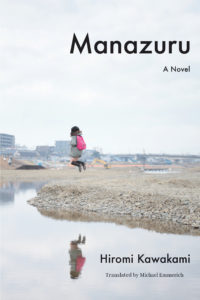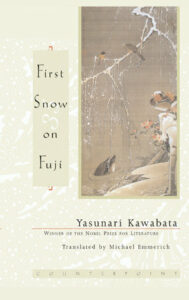Michael Emmerich
Hiromi Kawakami was born in Tokyo in 1958. Her first book, God (Kamisama) was published in 1994. In 1996, she was awarded the Akutagawa Prize for Tread on a Snake (Hebi o fumu), and in 2001 she won the Tanizaki Prize for her novel Strange Weather in Tokyo (Sensei no kaban), which was an international bestseller. The book was short-listed for the 2012 Man Asian Literary Prize and the 2014 International Foreign Fiction Prize.
Allison Markin Powell is a translator, editor, and publishing consultant. In addition to Hiromi Kawakami’s Strange Weather in Tokyo, The Nakano Thrift Shop, and The Ten Loves of Nishino, she has translated books by Osamu Dazai and Fuminori Nakamura, and her work has appeared in Words Without Borders and Granta, among other publications. She maintains the database japaneseliteratureinenglish.com.
Books
Manazuru
A Novel
Startlingly restless and immaculately compact, Manazuru paints the portrait of a woman on the brink of her own memories and future.Twelve years have passed since Kei’s husband, Rei, disappeared and she was left alone with her three–year–old daughter. Her new relationship with a married man—the antithesis of Rei—has brought her life to a numbing stasis, and her relationships with her mother and daughter have spilled into routine, day after day. Kei begins making repeated trips to the seaside town of Manazuru, a place that jogs her memory to a moment in time she can never quite locate. Her time there by the water encompasses years of unsteady footing and a developing urgency to find something.
Through a poetic style embracing the surreal and grotesque, a quiet tenderness emerges from these dark moments. Manazuru is a meditation on memory—a profound, precisely delineated exploration of the relationships between lovers and family members.
First Snow on Fuji
The stories of Yasunari Kawabata evoke an unmistakably Japanese atmosphere in their delicacy, understatement, and lyrical description. Like his later works, First Snow on Fuji is concerned with forms of presence and absence, with being, with memory and loss of memory, with not–knowing. Kawabata lets us slide into the lives of people who have been shattered by war, loss, and longing. These stories are beautiful and melancholy, filled with Kawabata's unerring vision of human psychology. First Snow on Fuji was originally published in Japan in 1958, ten years before Kawabata received the Nobel Prize. Kawabata selected the stories for this collection himself, and the result is a stunning assembly of disparate moods and genres. This new edition is the first to be published in English.
Catapult | Counterpoint | Soft Skull | Hawthorne Books
20 Jay Street #704
Brooklyn, NY 11201
646.926.0805 | contact@catapult.co






